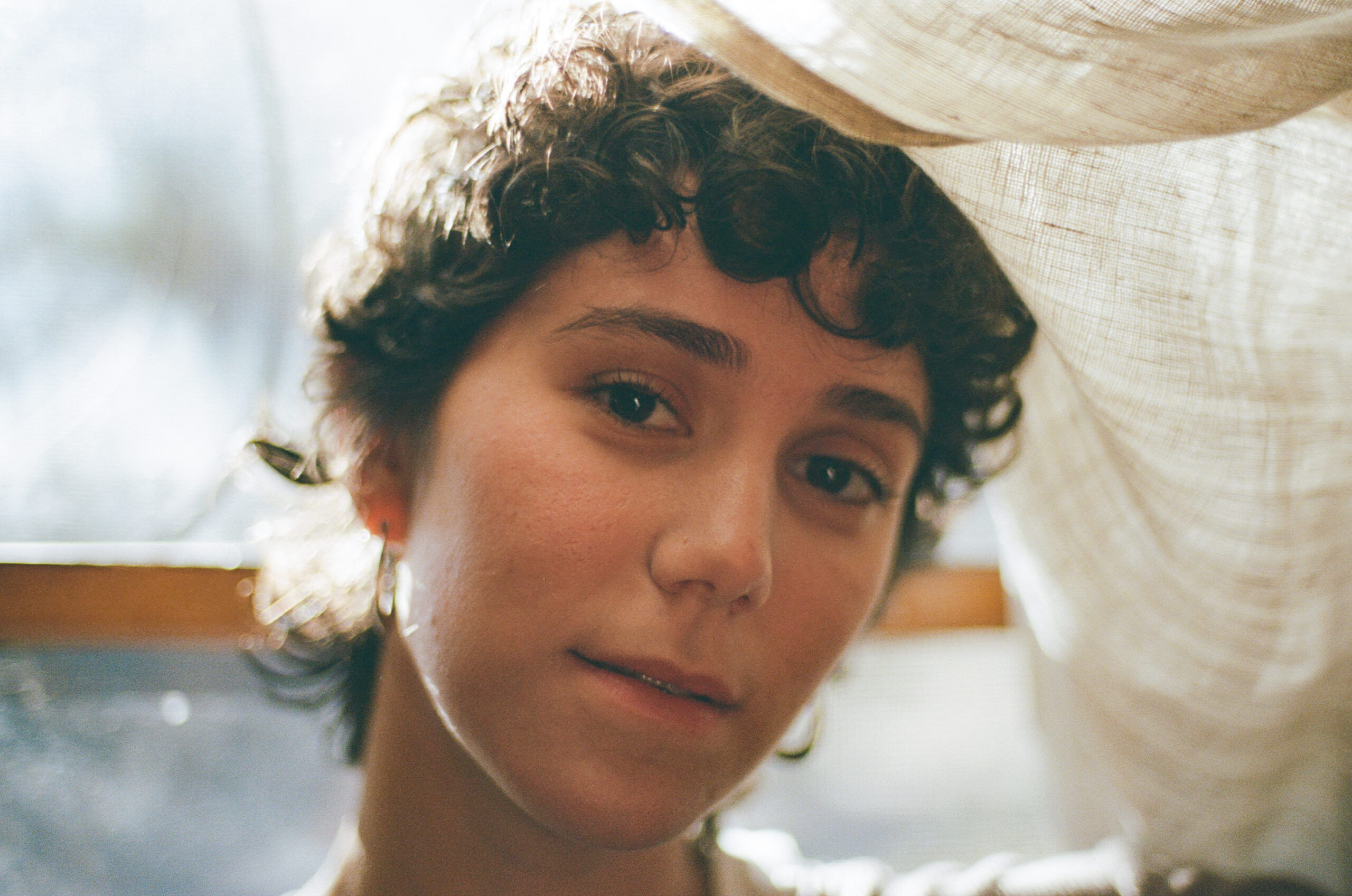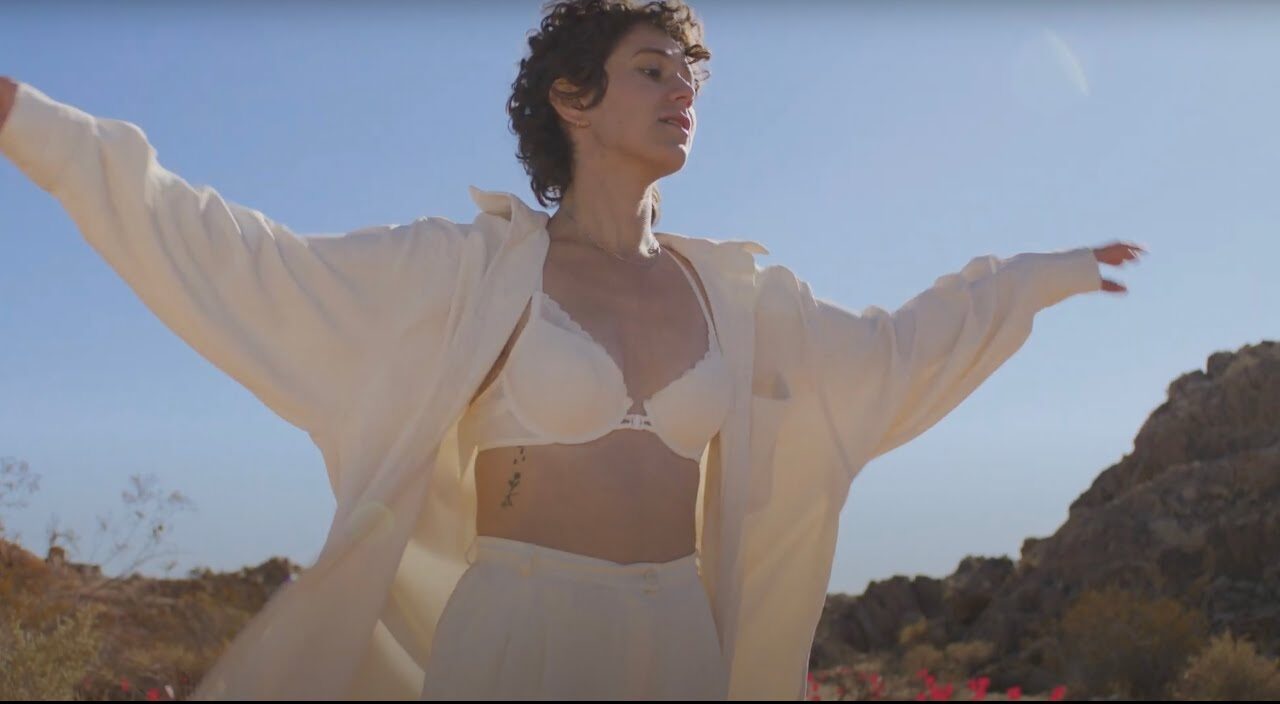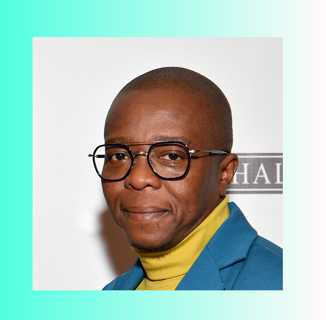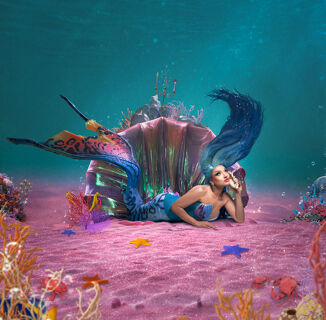The music video for “Parched” begins, naturally, in a barren desert. There, singer-songwriter Olive Klug dances, first alone, then with a partner who they must eventually leave behind. It’s a stunning visual match for Klug’s painfully personal lyrics and crystal clear vocals, trademarks for the 25-year-old folk artist.
“Parched” is the latest in Klug’s recent wave of singles, following the young adult anthem “Coming of Age” and rebellious “Out of Line,” building up to the release of Klug’s debut album later this year. INTO sat down with Klug to talk returning to their roots as a dancer, leaning into the authentic power of folk music, and embracing their Gemini tendencies.

Hi, Olive! Congrats on releasing your latest single, “Parched!” What’s the story behind the song?
I think it’s really interesting that I’m getting so many interviews for this song, because I actually feel the least comfortable talking about the story. I write, usually, about myself and my own feelings about where I am in life, how I’m feeling about myself, and this is one of those singles that actually is about somebody else.
It’s about a relationship I had that was kind of not a positive experience for me, but I really feel uncomfortable talking about it — because the ethics of songwriting are so funny, right? Like, I had my experience with this relationship, that person had their experience of this relationship, they’re probably very different. But I just wrote this when I was feeling like I had put so much energy into a relationship and wanting to make it work so badly, but the other person was just not ready for that and didn’t want that. And it’s kind of a representation of how it feels to be the person who wants more and is putting more effort in.
Gotcha. To that end, do you feel like your music is usually more focused on yourself, and this is a bit of a departure for you to be telling a story about somebody else?
Yeah, I definitely think so. I think that a lot of my songs aren’t about a specific relationship. I don’t tend to write most of my songs about romantic relationships. I tend to write about how I’m feeling in the world. I tend to write about my own self development. I tend to write about reflections on life and the world. And so to have this song be about a specific relationship actually makes me nervous.
I totally get that. Let’s talk about the music video, which is stunning. I understand it was a return to lyrical dance for you — can you tell me more about that?
When I was in middle school and high school, I used to be on dance teams, and used to do a lot of dance and express myself in that way. And I think that I have been wanting to return to that. And I noticed that when I was hearing mixes of this song for the first time, I was dancing a little bit and moving my body. And I think that it’s something that I’ve always wanted to return to and always wanted to get back into, but haven’t gotten my shit together to take a dance class or do anything like that. So I just was like, “Well, I’ve got this opportunity to make a music video!”
I was really inspired by some of dodie’s music videos. She incorporates a lot of lyrical dance into her videos. And I was like, “Wow, these are so cool!” When I watched those videos, I was like, “I want to be there. Like, I want to be one of the dancers in this video.” And so I was like, “If I have access to these resources, I might as well have this experience where I’m dancing again.” So that was really fun for me, to return to that and experience the song in a new way, which I think was really cool.
Now that you say that, I totally see the dodie vibes! So, this is the third single from your upcoming debut album. Can you tell me anything about the vision for this project?
Well, it’s my first project. And so it’s just exciting that I’m able to release a full project. I’ve never done that before. So I’m very excited about that. I was actually at a folk conference this past week, and I had a friend say to me, “You’re the only person that it doesn’t feel like you turn into a different person when you perform. I feel like I’m just having a conversation with you, Olive, just like I would have a conversation in the car with you.” And that really meant so much to me. That is exactly what I want to put off — like, that’s the kind of authenticity that I want to bring with this album. I think that it’s just a genuine representation of the development that I’ve gone through over the past couple of years. And a lot of it has to do with maintaining this magic, childlike wonder for the world into adulthood.
Over the past couple years, young people have experienced a really difficult world, I think, with the pandemic, with a lot of people’s rights being stripped from them, with a lot of violence. It’s been really hard to keep yourself healthy and keep your communities healthy and keep a positive, magical outlook on the world. And I think that the statement I want to make with the album is, you don’t make me jaded. The world cannot make me jaded. I am going to maintain my belief that people are good, and that the world is a beautiful place, even in the face of all this really shitty stuff.
I feel like that message was kind of coming through on the previous single, “Coming of Age,” too.
I mean, that one, I feel like, is actually a little bit less positive. [laughs] It’s about that journey of finding the joy and finding the magic, even when it’s really hard, and I think I’m honest about how it is really hard.
I think my first single, “Out of Line,” is a really good representation of finding the joy and the positivity and being like, “I don’t have to follow the rules that are set out for me. Everything’s so fucked anyway, so let’s make our own rules. Let’s make our own communities.” When you realize that you don’t have to live your life the way that people tell you to, you’re able to access that joy. So I think that’s a really good representation of the theme of the album.
That really speaks to the spirit of queer community building. Folk music, having this sort of Americana, home-grown stereotype, might not be where people expect to find queer representation — but do you feel that there’s a lot of queer representation in the folk music scene?
Yeah, I really do, actually. I think that there’s a ton of representation in the folk scene.
And as a singer-songwriter, what draws you to folk as a genre?
I don’t want to be what I’m not, and I think that I’ve never been able to be anywhere besides where I am. I think that folk music allows for that. There’s so much less performance — and I know that music is always a performance — but it feels like a genuine experience. It feels like it’s just, I’m telling you my feelings, you’re feeling this thing with me, and we’re all here together.
Beautiful! And what do you hope that listeners take away from your music?
Every song has a different meaning. But I think that, in general, I want people to be able to just access their feelings through my music. So whatever you may have been pushing down, whatever you may not feel safe to feel in other contexts, I hope that you can feel when you’re listening to my music.
I always joke around that my goal is to make people cry. That sounds really bad, but I think it’s really important to cry. And I think that if I can make people be in touch with things that they are not able to feel otherwise, I have done my job successfully. So yeah, I think that I hope you cry in a healthy way. That’s what I want. I want people to know that it’s okay to feel their feelings and it’s okay to cry.
I think it’s also okay to feel joy! I want people to be able to feel joy. When people ask me what my values are, I think that joy is my number one thing. Maybe it’s because I’m a Gemini, and I contain multitudes. I want people to feel joy, and I want them to cry.♦
“Parched” is now streaming on all platforms.
This interview has been edited for length and clarity.
Don't forget to share:
Help make sure LGBTQ+ stories are being told...
We can't rely on mainstream media to tell our stories. That's why we don't lock our articles behind a paywall. Will you support our mission with a contribution today?
Cancel anytime · Proudly LGBTQ+ owned and operated
Read More in The INTO Interview
The Latest on INTO
Subscribe to get a twice-weekly dose of queer news, updates, and insights from the INTO team.
in Your Inbox













